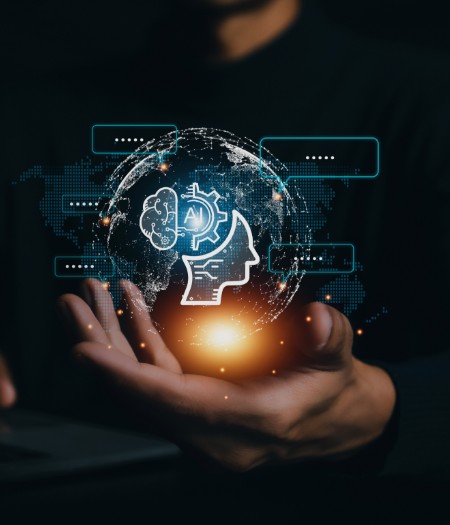Customer service has always been a priority for businesses, but in this digital era it is taking on a new sense of urgency due to competency growth and technology advancements. Across nearly every industry, customers have come to expect immediate responses to their queries, personalized support, even the ability to help themselves through self-service.
The integration of artificial intelligence (AI) has helped contact centers keep up with these demands by making information more accessible. Now, rapid advancements in AI and generative AI (Gen AI) technology are making virtual assistants even more capable, paving the way for streamlined efficiencies that empower both agents and customers, maximizing business value.
Combining AI with Cloud
To make the most of any AI application, companies first need a strong cloud foundation. The large language models often require tremendous compute power, and the ability to access huge volumes of data in real time. This requires scalability and accessibility that can only be found in the cloud. As a result, cloud hyperscalers are playing a key role in AI development, offering capabilities and tools that keep pushing the envelope.
Google Cloud’s Contact Center AI (CCAI), for example, has helped companies go beyond the limited capabilities of traditional chatbots to offer faster resolutions and truly elevated customer service. CCAI combines natural language processing capabilities with the data security, enterprise AI foundation model and accessibility of Google Cloud to instantly connect agents and customers with the information they need. The platform can scan requests to help agents better direct customers to the appropriate channels, gather necessary documents, and extract information from those documents. It can also follow along with conversations to provide real-time support, and later draw insights from those conversations to train human agents as well as the platform itself. Because Google CCAI services are flexible and customizable, they are compatible with numerous enterprise tech stacks and use cases.
Real-Time Support for More Human Interactions
At the same time, rapid advancements in Gen AI are constantly revealing powerful new use cases. New features offer even greater support for agents and customers through real-time analysis and recommendations, while enhanced language processing continues to make engagements more natural and helpful.
Wipro’s Agent Assist, a unique solution developed on Google Cloud, uses Gen AI capabilities to identify the language used by high-performing agents and coach other agents to ensure quality customer services throughout the company. The platform also transcribes calls in real time and offers suggestions to address customer issues, leading to more efficient and successful resolutions.
Products like this represent the next phase of AI implementation for call centers, building on the existing AI groundwork to make processes more efficient and useful.
Consider a familiar example: A banking customer calls because their credit card has been blocked. Because this is a relatively common request, agents likely know how to resolve it quickly. But solutions like CCAI and Agent Assist can expedite a resolution before the call is even transferred to an agent by extracting the intent of the request (unblock credit card, dispute/verify charges) and preparing the agent with the information they need to assist (displaying the account and card information, the problematic charges, authentication questions, and steps for resolution).
Extracting information from an email or a service ticket may not seem revolutionary, but using that to streamline such a common, time-consuming process can have a major impact on the overall customer service landscape. Agents handle tremendous call volumes. If companies can automate the right processes, they can lessen the burden of those volumes significantly, reducing the amount of time agents spend on routine tasks such as gathering information and freeing up more time for making sure the customer feels truly supported.
Continuous, Dynamic Training
As enterprises leverage Gen AI to support customers, they can also leverage it to train and support customer service teams. Using Gen AI to analyze customer interactions and suggest responses can make training more dynamic and continuous. The platform can offer step-by-step guidance to walk new agents through the process, offer suggestions for how to best respond to additional concerns the customer may have, and even help redirect the call if necessary.
With Gen AI, scripts are no longer static documents that only apply to a handful of instances; they’re created in real-time, drawing from similar interactions in the past and learning from them. As the platform learns from the top-performing agents, it can share those best practices with agents throughout the company, enabling teams everywhere to learn from each other.
Data Security and Responsible AI
Process automations like these can be very helpful for agents and customers, but they can also pose security challenges, especially in highly regulated industries like financial services and healthcare. Companies want to be sure that their data and their customers’ data will be safe.
To maintain data security and ensure compliance with regulations, companies need to implement the proper guardrails and responsible AI practices. Google has made a point to prioritize data security and privacy in its Gen AI practices, only transferring data through encrypted channels that are within Google’s control and not using that data to train its own Gen AI model. Similarly, Wipro’s four dimensions of responsible AI (individual, social, technical, environmental) take a comprehensive approach to AI risk mitigation so organizations can safely harness the full potential of Gen AI.
A common refrain among AI evangelists is that the technology is intended to work with, not replace. This goes for people as well as operations. The best Gen AI use cases for customer service will likely be the ones that leverage existing cloud capabilities, learn from past customer interactions, and support human agents in upholding the values of the organization. By harnessing the strengths of people and processes rather than replacing them outright, companies can multiply their impact and accelerate their growth.
 Locations
Locations



